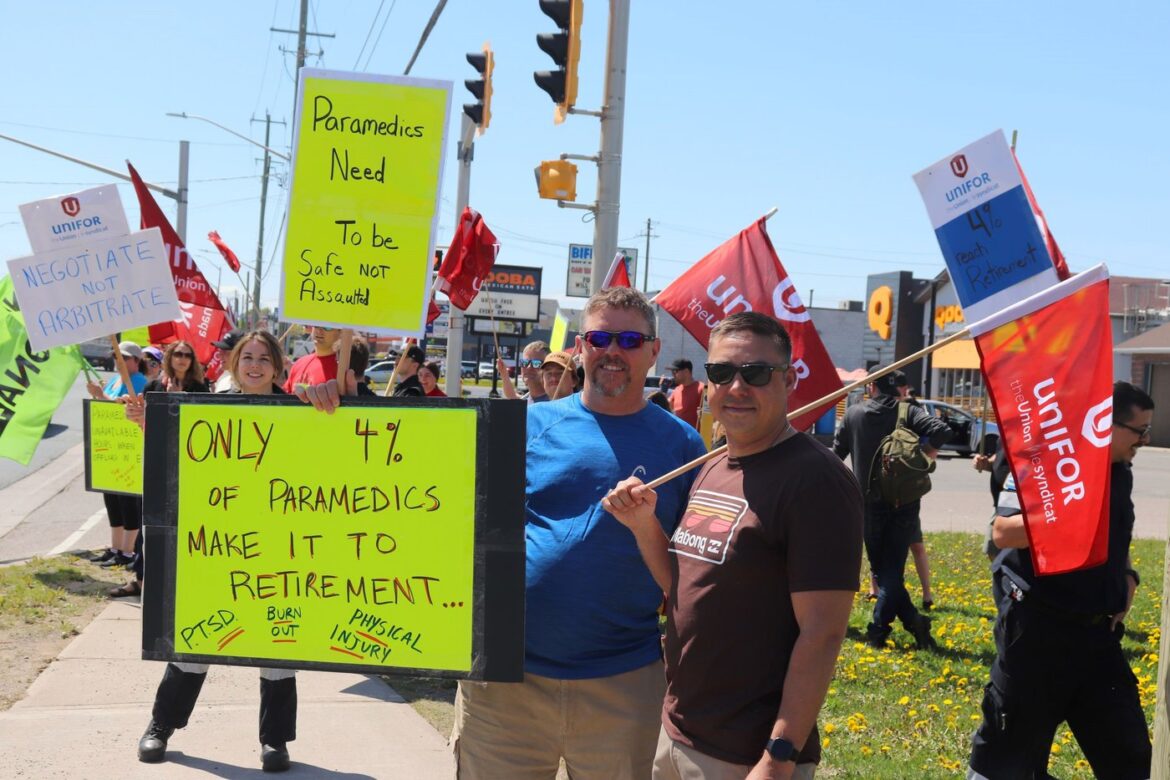Sault Ste. Marie paramedics took to the streets Tuesday afternoon to better inform the public of the challenges they are facing on the job and at the bargaining table.
One of the main issues highlighted during this rally was the pay disparity between paramedics and other first responders, such as police and firefighters.
To hammer this point home, a couple dozen people, including active paramedics and some Canadian Career College students, occupied the intersection of Great Northern Road and Lukenda Drive for about an hour, holding signs with slogans such as “First On Scene. Last in Pay.”
One rally attendee hoisted a sign that spelled out the average hourly rate for a first-class Sault paramedic ($40.89), comparing that pay to an equivalent position in the local police department ($53.73) and fire service ($50.04).
Other signs pointed to the fact that paramedics are not considered an “essential” service in Ontario, despite cops and firefighters being included in this categorization.
Unifor Local 1359 vice-president Mary Casola told The Sault Star that union members wanted to broadcast these issues publicly now that they are negotiating a new contract with the paramedics’ employer, the District of Sault Ste. Marie Social Services Administration Board (DSSMSSAB).
“The employer and the union are at the bargaining table. Our contract has been expired for over a year,” Casola said during Tuesday’s rally.
“We’ve been at the table for approximately nine dates, two of those dates were with a conciliator, and we last met on May 16.”

Unifor Local 1359 currently represents 89 paramedics, including 66 full-time workers and 23 part-time, according to Casola.
The last time Unifor Local 1359 staged a major public demonstration for its paramedics was in late 2017 and early 2018, when these workers were still employed by the City of Sault Ste. Marie.
After threatening to strike if their demands over wage increases weren’t met, the union eventually realized that such an action would be ineffective after the Ontario Labour Relations Board ruled that 80 per cent of its workforce would have to report for duty during a walkout.
Unifor Local 1359 abandoned any plans to strike in the summer of 2018 and eventually settled a new contract with the city the following year.
Despite working under a new employer (DSSMSSAB) as of Jan. 1, 2020, Casola said the same issues involving wage disparities have persisted, which has had a significant impact on the recruitment and retention of staff.
“A lot of paramedics use us as stepping stones. They will work for us for a couple years and go on to fire or work with us and go on to police,” she said during a follow-up interview on Wednesday.
“We’ve had four people leave, one left for med school to become a doctor and three left to be (registered nurses), and that was all within the last five years.”
Casola said this high turnover rate has left the current crop of active paramedics exhausted, especially when they’re responding to over 20,000 calls per year by her count.
“So our employer needs to wake up,” she said. “People are not coming in anymore for overtime because they’re burnt out and they don’t feel appreciated. They don’t feel heard.”
Hannah Fairburn, the paramedic unit chair for Unifor Local 1359, was similarly frustrated with this current wage disparity between local first responders, with paramedics being exposed to a lot of the same risks and hazards as police and firefighters.
“We go to the same calls as police, fire goes to the same calls as us, and we all work together. And yet there’s a significant pay difference with our jobs,” Fairburn said.
“So I think the public needs to be aware that there’s quite a difference in how we’re compensated, as opposed to other first responders, and I think that needs to be spread around.”
The Sault Star reached out to DSSMSSAB CEO Mike Nadeau for comment on Tuesday’s rally and the ongoing contract negotiations with the union. He sent the following response via email.
“The DSSMSSAB values the important work of paramedics and is committed to working through the formal bargaining process. As such we are unable to make a public comment at this time.”






